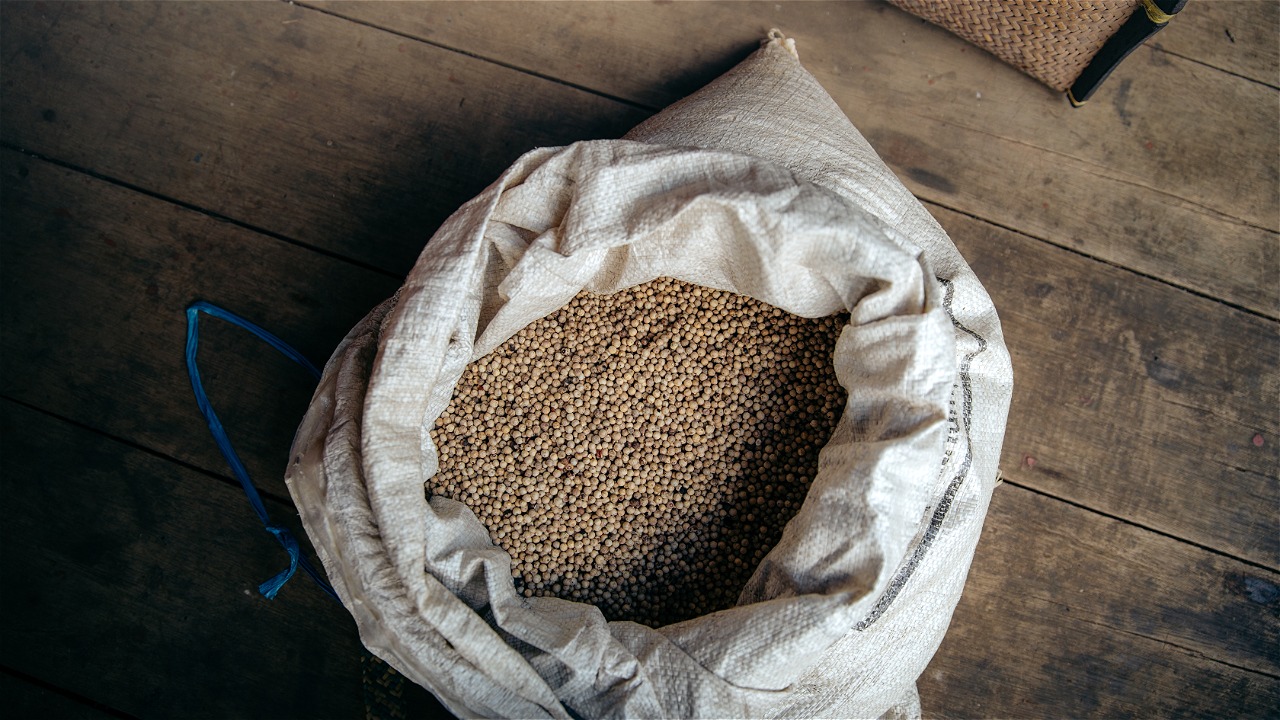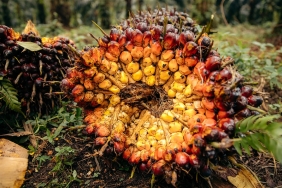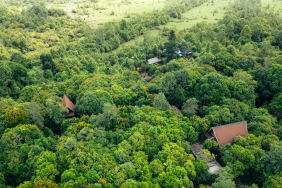WWF-INDONESIA INVITES PUBLIC TO IMPLEMENT LOW-EMISSION PRODUCTION-CONSUMPTION PROGRAM
"Sustainable Consumption and Production in Thailand, Indonesia, and Philippines" (SCP-TIP) is a program led by WWF-Germany that is implemented in three countries in Southeast Asia (Thailand, Indonesia, and the Philippines). The launch of the program, which was held on Wednesday (26/7) at Goethe-Institut Indonesia, Jakarta, aims to help encourage communities in the three countries to integrate and apply the principles of sustainable production and consumption as a support for national climate change mitigation strategies in terms of politics, business practices, and civil society movements.
The launch activity was attended by invitees consisting of stakeholders, namely the Ministry of Environment and Forestry of the Republic of Indonesia (KLHK), the Indonesia Business Council for Sustainable Development (IBCSD), representatives of companies and business associations from the retail and consumer products industry, as well as representatives of NGOs and communities engaged in sustainable production and consumption issues. Journalists from a number of media were also invited to cover the launch. The involvement of stakeholders in the implementation of the SCP-TIP program is very significant to achieve the objectives of the program, namely the development of climate change mitigation actions and strategic policies to reduce greenhouse gas emissions in the agriculture/food sector, integration of sustainable production and consumption principles in business activities and increasing consumer knowledge and understanding of sustainable production and consumption activities.
The launch of the SCP-TIP program consisted of two main agendas, namely the presentation of resource persons from agencies related to the SCP-TIP program and a workshop that included government, business and community representatives to map initiatives and programs that support the achievement of the SCP-TIP program objectives.
The resource person presentation featured two representatives from the Ministry of Environment and Forestry, namely Ms. Nurmayanti as Head of Product Standardization Division, Center for Standardization of Environment and Forestry (Pustanlinghut) and Ms. Emma Rachmawati as Assistant Deputy of Mitigation and Preservation of Atmospheric Function. The private sector presentation featured Mr. Budi Santosa as Executive Director of the Indonesia Business Council for Sustainable Development (IBCSD) and the SCP-TIP program presentation was conducted by Ms. Dewi Satriani as Campaign and Mobilization Manager of WWF-Indonesia.
In the workshop session that took place in the second half of the activity, participants were divided into two discussion groups representing government and private groups, as well as community groups and civil society organizations. The public and private group workshop participants consisted of IBCSD, Unilever, RSPO, FSC, ISPO, Tessa Tissue, Astra Agro, PT Inovasi, and Avani Eco. The purpose of the discussion in this group is to identify sustainable production practices that have been carried out by the private sector, as well as to consider the role of consumer good brands and retailers that connect the production sector with end consumers.
Regarding sustainable production practices, several private companies participating in the workshop admitted that they have made a series of efforts to reduce carbon production. Unilever stated that it has reduced CO2 from energy and water use, and has achieved zero waste in its production activities.
This is proven by innovating products globally that apply sustainability aspects. The same thing is also stated by Tessa Tissue as a tissue manufacturer that has received the FSC label. The label indicates that its tissue products come from plantations that do not damage the environment. As one of the rulers of the palm oil industry, Astra Agro also stated that it has carried out sustainable production practices such as reducing pesticides, efficient use of diesel, purchasing tools to prevent fires, and others. In addition, Astra Agro has also paid attention to sustainability in the aspect of waste.
However, according to PT Inovasi, there is still a gap between producers and consumers regarding knowledge of sustainable products. Many private companies have made efforts for sustainable production, but many consumers do not know about it. FSC and RSPO (certification bodies for processed paper and palm oil products) state the same thing that Indonesian consumers do not understand sustainable products. Even though environmentally labeled products incur large production costs and can result in losses for the company if not many consumers understand it.
Therefore, the role of consumers is very important for the success of the SCP-TIP program. If the amount of consumer demand for certified products increases, it will automatically reduce the production of products that are not environmentally friendly. Based on a survey conducted by RSPO, the concept of sustainability is difficult for consumers to understand. If they are only told which products are sustainable, without any explanation, consumers will not easily feel that the existence of sustainable products is also the responsibility of consumers.
Avani Eco also thinks so, according to it this happens because there is a gap between environmental issues and consumer lifestyles. Tessa Tissue suggested that in addition to education, it is also necessary to change the consumer environment by targeting the millennial market. A movement is needed to inspire consumers to take part in the SCP-TIP program. One example suggested by PT Inovasi, the healthy living movement can be used as an example of a means of awareness about sustainable products. WWF-Indonesia in this case has conducted the #BeliYangBaik campaign.
In the community and civil society group workshop, participants consisted of Burgreens, Project Semesta, Indonesian Organic Community (KOI), Earth Hour Community (Bandung, Jakarta, Depok, Bogor), IBCSD, Sustainable Development Foundation, GPIB Jatipon, HIVOS, and Greeneration. This discussion aims to identify initiatives, activities, and community programs that have been or are currently running that can contribute to the targets of the SCP-TIP program, as an effort to increase consumer awareness of sustainable consumption and production by presenting the availability of information for consumers.
Several workshop members shared some of the activities and programs that have been and will be implemented. Burgreens has been promoting 'clean eating' by doing Burgreens goes to school and office with the 'train for trainers' method. 'Clean eating' is a lifestyle that only consumes organic ingredients. Another case with Project Semesta, as an association of young creative entrepreneurs who prioritize aspects of sustainability, Project Semesta's main focus is to become a forum for local brands producers who are exploring the process of sustainable product certification. So, the future plan is to hold an inaugural event entitled Feel Good Market by targeting the public to form consumer awareness of certified products, but before that, education will first be carried out to brand owners, regarding the principles of sustainability.
KOI has also made similar efforts to create a market place for organic products by creating bazaars in shopping centers and developing the organic.id website. The methods used by KOI in carrying out education are "getok tular" (spreading success stories from people who feel the benefits of organic products), conducting activations in the form of workshops and cooking demonstrations, education to schools and offices, and the latest is DiOn (Online Discussion) through Whatsapp chat groups by raising topics about organic lifestyle.
As a partner of WWF-Indonesia, the Earth Hour community has an important role in increasing consumer awareness of sustainable consumption-production, one of which is campaigning. #BuyYangBaik. The methods used also vary, some spread information through social media about what products have been certified, some visit schools, offices, and media to spread the information, and some do it at women's social gatherings. Another case with GPIB Jatipon, in educating #BeliYangBaik, it will conduct a Teens Choir which will work with several communities, but the focus of activities is more on managing products and waste.
Greeneration, which targets the lower middle class, has its own method to educate environmentally friendly habits, namely conducting the MRT (Masuk RT) program with the topic of 'Waste Management' and 'Organic Gardening'. HIVOS, which has the same target audience as Greeneration, also created a program entitled 'Food Lab' for street vendors with related communities in Bandung.
The discussion identified a number of community movements and initiatives that can support efforts to disseminate information about sustainable production and consumption. This point is considered to be of significant value to create more demand for sustainable products. While on the production side, the limited availability of sustainable products is still an unsolved obstacle. The lack of consumer demand and the absence of strong mechanisms or policies that promote sustainable consumption make businesses not aggressively market their products that are classified as sustainable.
The lack of representation from the government in the discussion caused a gap in the discussion that took place so it was decided that a similar activity would be carried out again by involving more government representatives.
The implementation of the SCP-TIP program overseen by WWF-Indonesia is expected to further encourage efforts to realize sustainable production and consumption practices as a widely accepted norm in the industry and consumers. The achievement of this will contribute significantly to the reduction of greenhouse gas emissions that have the potential to reduce the rate of climate change.





